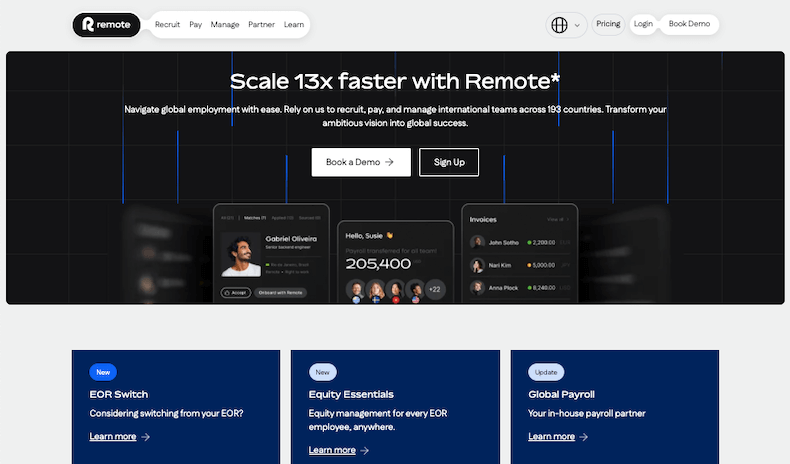Deel Vs Remote Comparison Summary
Hiring across borders without setting up local entities is no longer optional; it’s essential for growth. But choosing the right Employer-of-Record (EOR) partner is a high-stakes decision: you’re not just outsourcing payroll, you’re entrusting compliance, contracts, benefits, and risk.
In this head-to-head, we compare Deel and Remote from the perspective of HR, Finance, and Operations leaders. You’ll get a clear sense of where each excels (and where each has trade-offs) so you can choose the right fit for your organization’s priorities and scale.
Deel Vs Remote: Product Overview
Both Deel and Remote are leading EOR platforms that make hiring employees globally possible without opening local entities. While they have similar coverage, their philosophies and operating models differ.
Deel
Deel positions itself as a unified platform combining contractor, payroll, and EOR services in one stack. It acts as your legal employer in countries where you don’t have entities, handling compliance, benefits, tax filings, and local employment risk.
Deel appeals to mid-size and high-growth companies looking to scale quickly without managing multiple vendors. The product leans automation-forward, with templated contracts, guided workflows, and a dashboard-centric experience. Its unique value is in offering seamless transitions between models, contractor, EOR, and full payroll, all in one interface.
Remote
Remote also operates in over 150 countries and focuses heavily on compliance and legal control. Unlike many providers that rely extensively on third-party partners, Remote owns or directly manages most of its local entities.
This approach gives it more control over compliance and liability. Remote’s philosophy is service-oriented: while the platform is modern and intuitive, it prioritizes deep local expertise and high-touch support. Its value proposition lies in compliance certainty, IP protection, and predictable operations in complex markets.
Deel Vs Remote: Feature Comparison Table
| Feature | Deel | Remote |
|---|---|---|
| Global Coverage | 150+ countries (mix of in-house entities and local partners) | 150+ countries (largely direct entity ownership and local compliance teams) |
| Platform Type | Unified global employment platform covering EOR, contractors, and payroll | EOR-first with integrated HRIS and payroll |
| Onboarding Speed | Guided workflows, templated contracts; often 3–5 days depending on jurisdiction | High-touch onboarding with direct legal oversight; typically a few days to a week depending on country |
| Contractor Support | Yes, built-in self-serve contractor management, contract templates, and misclassification protection | Yes — contractor management module with competitive pricing |
| Payroll Engine | Centralized multi-country payroll with option to manage employees in existing entities | Localized in-country payroll integrated into a single dashboard |
| Benefits | Country-specific benefit packages (health, pension, insurance) managed locally through the platform | Customized benefits per country guided by local HR and legal teams |
| Compliance & IP Protection | Compliance-focused contracts, automated updates, built-in IP transfer and local legal backup | Strong compliance controls due to entity ownership, advanced IP protection features |
| Platform UX/UI | Modern, modular dashboard with smooth transitions between contractor, EOR, and payroll | Clean, well-integrated UI with slightly less modular flexibility than Deel |
| Integrations | Broad set of integrations with popular HRIS, finance, and IT tools; strong API support | Solid integrations and APIs, with a focus on deeper HRIS and payroll connectivity |
| Customer Support | 24/7 global support, in-app help, and regional legal/HR specialists | Dedicated account managers with local HR/legal experts per region |
| Pricing | EOR: around $599/employee/month (varies by country); Contractors: $49/contractor/month; Payroll-only: $29/employee/month | EOR: typically $599/employee/month on annual billing or $699/month on monthly billing; Contractors: $29/contractor/month |
| Security Certifications | SOC2, GDPR compliance, ISO-aligned data practices | GDPR and ISO-aligned practices with added data control due to direct entity ownership |
| Scalability | Built for organizations scaling across HR, IT, and Finance with seamless module additions | EOR-first focus with solid ability to integrate additional HR and payroll functions |
Deel Vs Remote: Deep Dives on Key Features
Onboarding & Speed
Deel’s automation-led model enables quick onboarding, often just a few business days in straightforward jurisdictions, thanks to guided workflows and pre-built templates.
Remote’s onboarding is slightly more hands-on, involving deeper compliance checks and legal oversight. While this can take a few extra days, it often reduces later compliance issues in more complex markets.
Compliance, Entity Control & IP Protection
Remote’s ownership of local entities in most countries gives it stronger control over compliance and reduced reliance on third-party intermediaries. This setup often provides clearer liability coverage and enhanced IP protection, making it attractive for companies in regulated industries.
Deel, while compliant and secure, uses a hybrid model of its own entities plus local partners. This allows for wider global reach but may introduce more variability in local compliance structures.
Pricing & Total Cost of Employment
Both platforms use a subscription-based pricing model with country-specific statutory costs layered on top. Deel’s pricing is generally transparent and slightly more flexible for smaller teams or hybrid contractor/EOR use cases.
Remote emphasizes predictable flat-rate pricing with no upfront fees. Its annual billing option can reduce per-employee costs compared to month-to-month plans.
Support & Local Expertise
Deel offers round-the-clock support and unified help for its EOR, contractor, and payroll modules.
Remote focuses on personalized service through dedicated account managers and local legal/HR experts, which can be advantageous when expanding into challenging jurisdictions.
Editor’s Note
The core difference lies in philosophy:
- Deel is automation-driven, aiming to simplify and accelerate global hiring with flexible models and a modern platform experience.
- Remote prioritizes compliance assurance, owning its entities for tighter legal control and offering high-touch, expert-led support.
For companies looking to hire rapidly across many markets with minimal friction, Deel’s agility and dashboard-driven model are appealing.
For organizations entering legally complex markets, such as financial services or industries with strict IP regulations, Remote’s deeper compliance and entity-owned model may feel more secure even if onboarding takes slightly longer.
Both are premium solutions, so the choice often comes down to whether you prioritize speed and platform flexibility (Deel) or compliance depth and dedicated support (Remote).
Final Recommendation
Choose Deel if you:
- Need a tech-forward, scalable solution to manage EOR, contractors, and payroll from one platform
- Prioritize faster onboarding and automation to speed up hiring in multiple countries
- Have an internal HR or legal team that can handle occasional edge cases or compliance queries
Choose Remote if you:
- Value high-touch support and entity-level compliance control for complex or regulated markets
- Want added assurance around IP protection and risk mitigation
- Prefer predictable pricing and strong in-country expertise over speed















